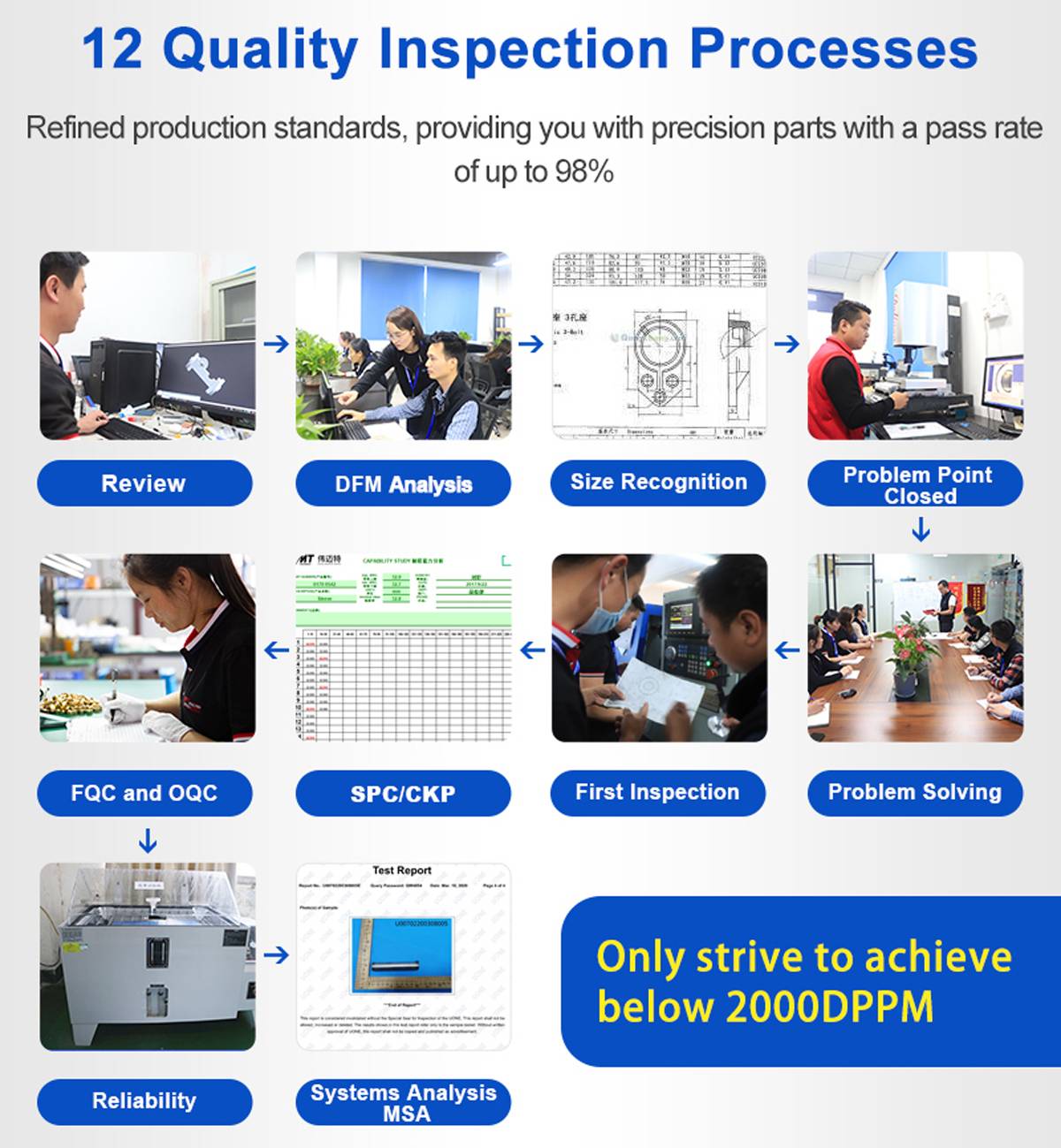15 years one-stop China custom CNC machining parts factory

Hey there I’m VMT Sam!
With 25 years of CNC machining experience we are committed to helping clients overcome 10000 complex part-processing challenges all to contribute to a better life through intelligent manufacturing. Contact us now
 166 |
Published by VMT at May 04 2024
166 |
Published by VMT at May 04 2024
In the field of CNC machining part manufacturing, CNC machining is widely utilized for its high precision and efficiency. However, during the actual production process, CNC machined parts often encounter some quality issues that affect product performance and longevity. This article will delve into the analysis of common quality issues in CNC machined parts and propose corresponding solutions to help CNC machining factories enhance product quality and competitiveness.

I. Common Quality Issues in CNC Machined Parts
Dimensional Accuracy Non-compliance
Dimensional accuracy is a crucial indicator of part quality in CNC machining. However, due to factors such as machine tool accuracy, tool wear, and fixture precision, achieving the desired dimensional accuracy for parts can be challenging.
Poor Surface Quality
Surface quality directly impacts the lifespan and performance of parts. During CNC machining, factors such as cutting speed, cutting depth, and improper coolant usage may result in surface defects like scratches and burrs, affecting surface quality.
Part Shape Deformation
Part shape deformation is prone to occur during CNC machining due to factors such as cutting forces and thermal deformation, leading to deviations from the designed dimensions and shape.

II. Solutions to CNC Machined Parts Quality Issues
Enhance Machine Tool Accuracy and Stability
Regular maintenance and upkeep of machine tool accuracy and stability are critical factors affecting part quality. CNC machining factories should select high-precision and stable machine tool equipment and conduct regular maintenance to ensure accuracy and stability.
Optimize Cutting Parameters and Tool Selection
Cutting parameters and tool selection significantly influence the quality of CNC machined parts. Suitable tool types and cutting parameters should be chosen based on part materials and machining requirements to minimize cutting forces, reduce thermal deformation, and improve machining accuracy and surface quality.
Improve Fixture Design and Usage
Fixtures play a crucial role in maintaining part position and stability during CNC machining. CNC machining factories should design appropriate fixture structures tailored to the characteristics of different parts to ensure stability and precision during machining. Additionally, fixture accuracy and rigidity should be guaranteed to minimize part deformation and quality issues caused by fixture inaccuracies.
Enhance Coolant Usage and Management
Coolants play a vital role in cooling, lubricating, and cleaning during CNC machining. Proper coolant usage can reduce cutting temperatures, mitigate thermal deformation, and enhance part surface quality. CNC machining factories should select suitable coolants and adjust coolant flow rates and temperatures according to machining requirements to ensure effective coolant performance.
Introduce Advanced Inspection Equipment and Technology
The introduction of advanced inspection equipment and technology, such as coordinate measuring machines (CMM) and laser scanners, enables comprehensive and accurate inspection of CNC machined parts to detect and address quality issues promptly. Real-time monitoring and predictive analysis of the machining process using data analysis and processing technology further enhance machining accuracy and quality stability.
Strengthen Personnel Training and Management
CNC machining factories should strengthen training and management of technical personnel to improve their professional skills and operational proficiency. Regular skill training sessions and knowledge exchange activities should be organized to facilitate learning and improvement among technical staff. Moreover, establishing a sound quality management system and incentive mechanism will motivate technical personnel, fostering their enthusiasm and creativity to elevate the quality level of CNC machined parts.
III. Conclusion
Common quality issues in CNC machined parts include dimensional accuracy non-compliance, poor surface quality, and part shape deformation. To address these issues, CNC machining factories should implement measures such as enhancing machine tool accuracy, optimizing cutting parameters, improving fixture design, enhancing coolant usage, introducing advanced inspection equipment, and strengthening personnel training and management. Adhering to these strategies and fostering innovation will be crucial for the future development of CNC machining factories amidst technological advancements and market changes.
IV. Outlook
In the future, with the rapid development of intelligent manufacturing and the industrial internet, CNC machining will achieve higher levels of automation and intelligence. By incorporating advanced CNC systems, sensors, and cloud computing technology, real-time monitoring, data analysis, and optimization adjustments during the machining process can further enhance the quality and efficiency of CNC machined parts. Additionally, as new materials, processes, and technologies emerge, the CNC machining field will witness more opportunities for innovation and development.
In summary, addressing common quality issues in CNC machined parts requires CNC machining factories to adopt a multi-faceted approach and comprehensive strategies. By enhancing machine tool accuracy, optimizing cutting parameters, improving fixture design, enhancing coolant usage, introducing advanced inspection equipment, and strengthening personnel training and management, CNC machining factories can effectively elevate the quality level of CNC machined parts. Moreover, staying abreast of the times and fostering innovation will be key to the future development of CNC machining factories.
Ready To Start Your Next Project?
Get Instant Quote

Request a Free Quote
Send us a message if you have any questions or request a quote. We will get back to you ASAP!